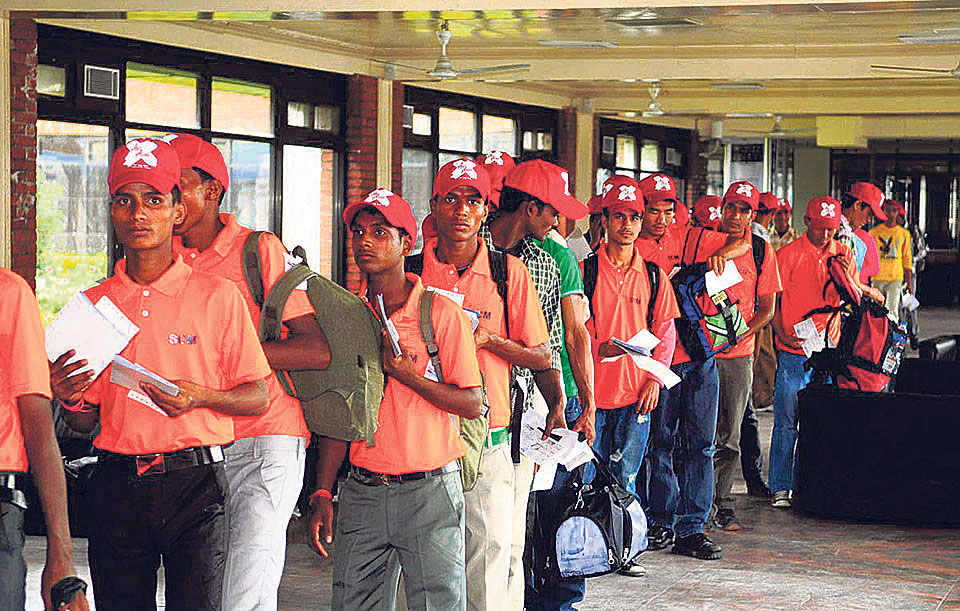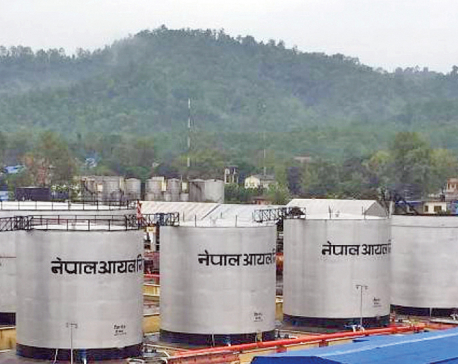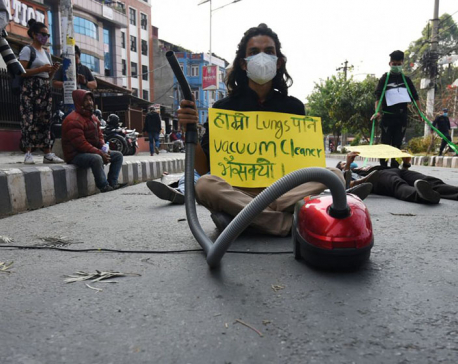
OR
Is foreign employment a choice or a compulsion?
Published On: January 23, 2021 07:00 AM NPT By: Bipana Thapa


Bipana Thapa
Bipana Thapa is a Communication and Advocacy Officer in an NGO that works for rescue and repatriation of Nepali migrant workers.beepanathapa@gmail.com
More from Author
- Think beyond short-term for migrant workers
- Is foreign employment a choice or a compulsion?
- A Kenyan dies of suspected high altitude sickness, seven Kenyans airlifted to Kathmandu
- Nepal condemns recent drone attacks on Saudi Aramco oil processing facilities
- Belt and Road Initiative is not a military alliance: Dahal (with video)
Labor migration is not safe for innocent Nepali migrant workers. The government should ensure that every single Nepali worker in foreign land is paid decent salary and treated with dignity.
Foreign employment has become a trend in Nepal. After reaching certain age, people start contacting recruiting agencies to fly to foreign lands. According to the latest data of Nepal Association of Foreign Employment Agencies (NAFEA), currently there are 853 recruiting agencies in Nepal. People visit these recruiting agencies and submit their papers to leave the country.
In 2017-18, 612,685 work permits were issued for 142 countries while nearly 1,400 Nepali workers had left the home country in the same period every day to work in foreign lands as per the data of the Department of Foreign Employment (DoFE).
According to 'A Country Profile 2019' by International Organization of Migration (IOM), Nepal, Qatar, United Arab Emirates (UAE), Saudi Arabia, Kuwait and Malaysia are the popular destinations for Nepali migrant workers. Qatar and the UAE were the most popular destinations in 2019, comprising 58 percent of the total number of permits issued.
Stories of sufferings
Unemployment is one of the key drivers for labor migration. According to Central Bureau of Statistics (CBS), the unemployment rate in 2018 was 1.35 percent while it increased in two consecutive years to 1.41 percent and 1.47 percent respectively.
Dil Bahadur Rai (name changed), 28 of Makawanpur, completed eighth grade. He comes from a family with low economic status. His family had taken a loan to build a house. In order to pay back the loan, Rai had to go for foreign employment.
He contacted with a recruitment agency in Kathmandu and paid NRs. 1, 10, 000 to start the process to go to Saudi Arabia. He managed this money by taking loan from local money lender. While the contract paper he signed before flying mentioned ten working hours with salary of SAR 1,200 he had to work for 17 long hours a day. Though he was initially sent as a kitchen helper, he was given additional works including cleaning, taking orders, etc. So he immediately contacted the recruiting agency asking to bring him back to Nepal but the recruiting agency forced him to stay back and continue with the assigned work.
After three months in Saudi Arabia, Covid-19 outbreak started. After living for eight long months without proper food and accommodation, and with help from a Nepali diaspora organization, Rai managed to return Nepal.
Similarly, Hari Bahadur Rokaya (name changed), as an elder sibling in the family, had to take all the responsibility to look after his family as his father died. He had to take care of his old mother, younger brother, sister, wife and his two children.
Rokaya, a permanent resident of Mugu, one of the remote districts of the country, said: “I come from a very remote place of Nepal. There are no jobs there and I often had to travel to Tarai to search works.”
Rokaya, an SLC graduate, was learning some basic survey technical skills.
While in Tarai, he heard people talking about earning money easily and saving from NRs 50,000 to 60,000 a month in foreign employment. Excited, he decided to apply for foreign employment.
But coming to Kathmandu from Mugu was not easy. He managed to arrive and on sixth attempt, received a visa for which he paid NRs 2, 00,000. He was sent to work as a laborer in a construction company.
After a year, however, the company he was working for was shut down, while it owed him salaries of six months. "The situation further worsened after the Covid-19,” he said.
Badri Prasad Ranabhat (name changed) thought of travelling to Malaysia once again, where he had previously worked for three years. It was the poor family economy which made him leave the country once again.
Badri came to Kathmandu all the way from Chitwan and submitted all his documents in a recruitment agency. The recruiting agency asked for NRs 1, 60,00 which he managed to fork out by taking loan from relatives and neighbors.
As per the contract that he signed before flying, he was to be paid RM 900 for working 12 hours a day. After reaching Malaysia, he found that he would be paid much less and the nature of work was also different from the one mentioned in the contract. After working for eight months, he ran away. He also had pending salary of three months.
These are just the representative stories. People are compelled to go for labor migration because of poverty and unemployment. Many people return empty handed without proper clothes on. They are rescued by various volunteering organizations. Uneducated as they are (most of them), they are not able to know they are being duped by recruiting agencies.
Despite several initiatives taken by the Nepal government for safe migration, people still have to suffer in foreign lands. Ministry of Labour, Employment and Social Security (MoLESS) has established a call center with the aim to provide prompt assistance to migrant workers in Nepal or in destination countries. But many people do not know about this. Likewise, the government has instituted a “free visa free ticket” scheme whereby employers are to bear the visa and air travel expenses for workers going for employment in Saudi Arabia, Kuwait, United Arab Emirates, Qatar, Oman, Bahrain and Malaysia. Yet, recruiting agencies charge them huge amount of money in the name of visa procedures and fees.
Labor migration is not safe for innocent Nepali migrant workers. People go for foreign employment not out of choice but out of a compulsion. The government should ensure that every single Nepali worker in foreign land is paid decent salary and treated with dignity.
You May Like This

NOC slashes price of petrol by Rs 7 per liter, diesel and kerosene by Rs 5 per liter
KATHMANDU, May 15: Nepal Oil Corporation (NOC) has announced a significant reduction in the prices of petrol, diesel and kerosene. Read More...

‘Our lungs have turned into a vacuum cleaner’
The participants of the symbolic protests drew attention of the government to immediately implement the Kathmandu Valley Air Quality Management... Read More...

Obesity growing among urban youths in Nepal
KATHMANDU, June 11: Once considered a problem only in high-income countries, overweight and obesity rates are on the rise in Nepal,... Read More...







Just In
- NRB to provide collateral-free loans to foreign employment seekers
- NEB to publish Grade 12 results next week
- Body handover begins; Relatives remain dissatisfied with insurance, compensation amount
- NC defers its plan to join Koshi govt
- NRB to review microfinance loan interest rate
- 134 dead in floods and landslides since onset of monsoon this year
- Mahakali Irrigation Project sees only 22 percent physical progress in 18 years
- Singapore now holds world's most powerful passport; Nepal stays at 98th











Leave A Comment